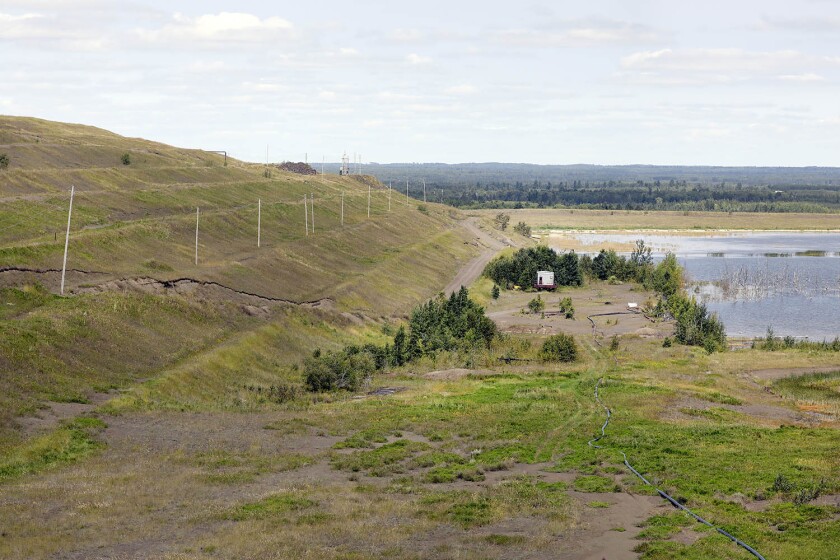ST. PAUL — The Minnesota Department of Natural Resources is asking the Minnesota Supreme Court to review last month's Court of Appeals decision that reversed three PolyMet permits and sent them back to the state agency for further review, saying the court's decision "fundamentally changes long-standing interpretation of state law."
"The Court of Appeals ruling represents a significant departure from the DNR’s long-standing application of state mining law," the DNR said in a statement Wednesday afternoon, Feb. 12. "Given the broad implications and precedential nature of the ruling, the DNR believes it is important to seek Supreme Court review of the Court of Appeals decision."
ADVERTISEMENT
PolyMet is aiming to establish Minnesota's first copper-nickel mine with an open-pit mine, processing facility and tailings dam near Hoyt Lakes and Babbitt at the former LTV Steel Mining Co. site. PolyMet .
Last month, — awarded by the DNR to the company in late 2018 — back to the DNR and said the agency must hold a contested-case hearing.
The contested-case hearing would require an administrative law judge to examine additional evidence and testimony on the project. Then, with information from the contested-case hearing in hand, the DNR must decide whether to reissue the permits.
On Wednesday, the DNR said it believes a contested-case was not needed for PolyMet's permits.
"In filing this petition, the DNR is not questioning the value of a contested case hearing when holding a hearing would aid the commissioner in resolving a disputed issue of fact. However, in this case, we believe the DNR thoroughly considered all of the disputed factual issues, produced substantial findings documenting the basis of our conclusions, and appropriately concluded that holding a hearing would not resolve these disputes," the DNR said.
The court said environmental groups Minnesota Center for Environmental Advocacy and WaterLegacy had already identified "numerous factual issues" that would have justified a contested-case hearing before the DNR issued its permits in 2018:
Whether an upstream construction of the tailings basin dam is unsafe.
Whether the tailings basin's use of a bentonite line would actually work.
Whether there is a better alternative to the planned "wet closure" tailings basin.
Whether the financial assurance meant to reclaim the site when PolyMet closes, either as planned or unexpectedly, is sufficient.
Whether Glencore, PolyMet's majority shareholder, should be added to PolyMet's permit to mine.
Opponents of the mine argue the project could send tainted runoff into the St. Louis River watershed and Lake Superior, while supporters say the project will provide more than 300 jobs on the Iron Range and move the area's economy away from iron ore dependence.
ADVERTISEMENT
Environmental groups vowed to defend the Court of Appeals' decision.
"By filing an appeal, PolyMet and the Department of Natural Resources are attempting to avoid a decision based on the facts and science," Minnesota Center for Environmental Advocacy CEO Kathryn Hoffman said. "If the DNR had done what the law requires and held a contested case hearing before issuing these permits, we would already have a decision."
Chris Knopf, executive director of Friends of the Boundary Waters Wilderness, said the DNR's appeal shows the agency "is digging in and doubling down on past mistakes in order to appease PolyMet."
"This is another example of DNR teaming up with the industry it is supposed to regulate," Knopf said.
Meanwhile, supporters of the project were pleased with the appeal.
"We, of course, were pleased to learn of the DNR’s petition," PolyMet spokesperson Bruce Richardson said. "It clearly demonstrates that there are a number of serious issues that need to be resolved by the court that have implications for the regulatory and permitting process that reach far beyond the PolyMet project."
House Minority Leader Kurt Daudt, R-Crown, applauded Gov. Tim Walz, a Democrat, and the DNR for filing the appeal.
ADVERTISEMENT
"I hope the Supreme Court will move quickly and recognize the flaws of the lower court decision. It’s long-past time for the PolyMet project to move forward," Daudt said in a statement.
Parties to the case have 14 days to file a response to the petitions. The Supreme Court then generally takes 60-90 days to decide whether it will take up the appeal.
Separately, PolyMet's national pollutant discharge elimination system, or NPDES, permit, which regulates water discharged from industrial activities, remains on hold after an after it was revealed the Minnesota Pollution Control Agency requested the Environmental Protection Agency on a PolyMet draft water permit until the public comment period ended.
The Minnesota Court of Appeals handed the case down to State District Court in St. Paul to determine whether the MPCA violated its own policy by requesting that federal regulators refrain from criticizing an essential permit for the mining project during its public notice period.
The Court of Appeals is also . Environmental groups say the MPCA failed to examine that showed the company was eyeing a mine almost four times larger than it had proposed in permit applications. The court has until April 7 to make a decision.









